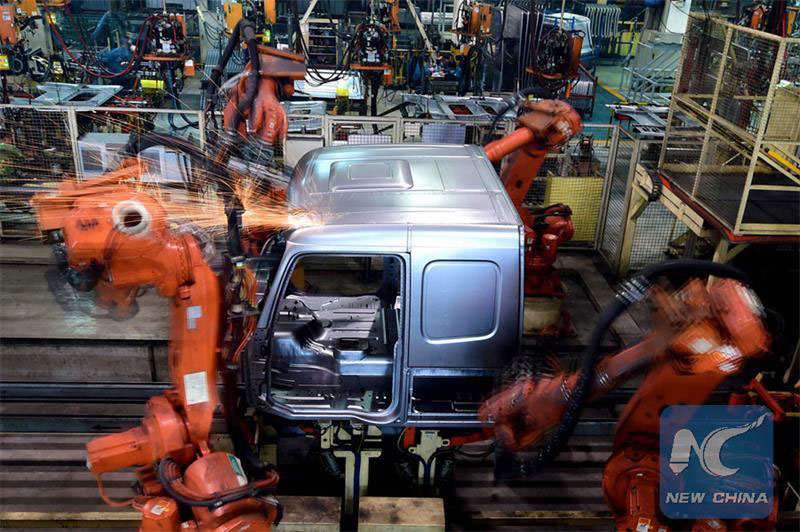


Photo taken on June 17, 2015 shows robots working at a truck factory in Jinan, capital of east China's Shandong Province.
In the latest report issued by Moody's Investors Service on Wednesday, the internationally famous credit rating agency downgraded its outlook on China’s credit rating from “stable” to “negative,” while affirming the still-respectable Aa3 grade on its sovereign debt.
But the credibility of Moody’s encountered a challenge in the Chinese market since its bearish prediction was not echoed by other voices in the financial market. Neither the currency exchange nor the Asia-Pacific share market seconded the negative outlook.
Generally speaking, operation and supervision of the financial market has shown increased reliance on credit rating tools in recent years. As industry giants, companies such as Moody's and Standard & Poor's now have a major influence.
The downgrading of a sovereign credit rating or outlook from a major player like that often leads to financial panic for implicated country. Even worse, if those involved are major powers, the panic can spill to other countries in the region or other countries encountering similar economic woes.
However, the forecast made by Moody's about China was not followed this time by a market panic. On the contrary, the RMB currency rate remained stable and the Asia-Pacific stock market kept rising following the downgrade.
A weakening of Moody’s authority may result from this prediction, which can be attributed to a poor understanding of the Chinese economy.
First of all, Moody’s misjudged what rising government debt means for China.
When downgrading China’s outlook, some of the reasons Moody's cited were uncertainty over authorities' capacity to implement economic reforms, rising government debt and falling reserves. However, one thing that was not taken into consideration was the differences between the debts of China, the U.S., Europe, Japan and other emerging markets.
Since investment is a big piece of China’s government expenditure, most debts have corresponding assets. This means that the same debt ratio would bring far less burden to China than to other debtors.
What’s more, the reason the Chinese government shouldered more liabilities is that it can partially prevent deflation caused by capital flight.
The moderate expansion of China’s deficit and debt within its settlement ability is not only good for short-sellers, but also healthy for the overall economy because it indicates that China’s currency supply is able to meet the demand brought by economic growth.
It also implies that currency creation relies less on foreign countries, and China’s financial system can be more independent as a result.
Similar to the rising government debt, China’s failing foreign currency reserve is not necessarily a bad thing for its economy.
The recent decrease in the reserve is mostly attributed to currency conversions of enterprises, financial agencies and residents.
Also, since the beginning of the new century, China’s policymakers have been distracted by rising foreign reserves as China has paid an enormous amount of seigniorage, or profit from issuing a currency, to western countries.
Therefore, in the past decade, the Chinese government has been encouraging the stockpiling of foreign exchange reserve in State coffers so as to diversify external assets and improve structure.
Even today, when the reserve has been cut down significantly, China still holds more foreign currency than any other country, which is more than enough to meet its foreign settlement demand.
At the same time, constant trade surplus and the influx of direct foreign investment bring the country more reserves.
When China’s ability to meet foreign settlement demand is not at risk, shortening the foreign exchange reserve means optimizing its structure of foreign assets.
In the long run, this will benefit the economy rather than undermining it.
For international rating giants like Moody’s, who misinterpret China’s national conditions and economy, it is essential to step up their game if they intend to maintain their dominance in the market.
The author is a researcher at China’s Ministry of Commerce.
Day|Week

 Qiandaohu supply ship named 'model ship' by PLA Navy
Qiandaohu supply ship named 'model ship' by PLA Navy Stunning Kuche on the Silk Road
Stunning Kuche on the Silk Road Tunisian man creates art of sand in Hangzhou
Tunisian man creates art of sand in Hangzhou Goddess teacher shares fitness program online
Goddess teacher shares fitness program online Getting close to PLA's easternmost post on the mainland
Getting close to PLA's easternmost post on the mainland 'Naked run' race held in Beijing
'Naked run' race held in Beijing Train Attendant Recruitment Held in East China
Train Attendant Recruitment Held in East China In pics: Russia's Su-35 fighter jets
In pics: Russia's Su-35 fighter jets Young monks learn kungfu in NE China temple
Young monks learn kungfu in NE China temple Scenery of Guzhu, thousand-year-old ancient village in E China
Scenery of Guzhu, thousand-year-old ancient village in E China